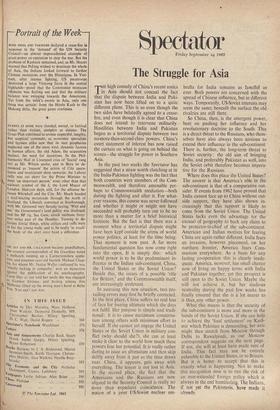The Struggle for Asia
THE high comedy of China's recent antics in Asia should not conceal the fact that the dispute between India and Paki- stan has now been lifted on to a quite• different plane. This is so even though the two sides have belatedly agreed to a cease- fire, and even though it is clear that China does not intend to intervene militarily. Hostilities between India and Pakistan began as a territorial dispute between two no-More-than-second-class powers. China's overt statement of interest has now raised the curtain on what is going on behind the scenes—the struggle for power in Southern Asia.
In the past two weeks the Spectator has suggested that a straw worth clutching at in the India-Pakistan fighting was the fact that both countries were members of the Com- monwealth, and therefore amenable per- haps to Commonwealth mediation—both during the fighting and after it. For what- ever reasons, this course was never followed and whether it might or might not have succeeded will probably turn out to be no more than a matter for a brief historical footnote. But the fact is that there was a moment when a territorial dispute might have been kept outside the arena of world power politics, at least for the time being. That moment is now past. A far more fundamental question has now come right into the open. It is simply this: which world power is to be the predominant in- fluence in the Indian sub-continent, China, the United States or the Soviet Union? Beside this, the issues of a possible 'role for Britain,' and the Commonwealth itself, arc increasingly irrelevant.
In assessing this new situation, two pre- vailing errors may first be briefly corrected. In the first place, China suffers no real loss of face for issuing ultimata which she does not fulfil. Her purpose is simple and tradi- tional: it is to cause maximum consterna- tion among others with minimum effort to herself. If she cannot yet engage the United States or the Soviet Union in military con- flict (why should she?), she can at least make it clear to the world how much these powers fear her potential. It is really rather daring to issue an Ultimatum and then skip deftly away from it just as the time draws near. China, it appears, gets away with everything. The lesson is not lost in Asia. In the second place, the fact that the Americans and the Russians are now aligned in the Security Council is really no more than expedient coincidence. The notion of a joint US-Soviet nuclear urn- brella for India remains as fanciful as ever. Both powers are concerned with the spread of Chinese influence, but in different ways. Temporarily, US-Soviet interests may seem the same; beneath the surface the old rivalries are still there.
So China, then, is the emergent power, bent on pushing her influence and her revolutionary doctrine to the South. This is a direct threat to the Russians, who them- selves have also always been anxious to extend their influence in the sub-continent. There is, further, the long-term threat to Soviet security : the old aim of bringing India, and preferably Pakistan as well, into the Soviet orbit therefore becomes impera- tive for the Russians.
Where does this place the United States? The answer is that America's role in the sub-continent is that of a comparative out- sider. If events from 1962 have proved that India cannot face up to China without out- side support, they have also shown in- creasingly That this support is likely to come from the Soviet Union. The United States lacks even the advantage (or the excuse) of geography to back any claim to be protector-in-chief of the sub-continent. American and Indian motives for fearing China are again rather different. India fears an invasion, however piecemeal, on her northern frontier, America fears ,Com- munism everywhere. As a basis for any lasting co-operation this is clearly inade- quate. America, morevet, has small chance now of living on happy terms with India and Pakistan together, yet this prospect is still open to the Soviet Union. Maybe she will not achieve it, but her studious neutrality during the past few weeks has finally ensured that she is a lot nearer to it than,any other. power.
What this means is that, the security of the sub-continent is more and more in the hands of the Soviet Union. If she can help to achieve the 'final settlement' on Kash- mir which Pakistan is demanding, her axis might then stretch from Moscow through Delhi to Rawalpindi, as our Moscow correspondent suggests on the next page. If not, she will at least have made sure of India. This fact may not be entirely palatable to the United States, or to Britain. But it is better to accept that this is exactly what is happening. Not to make this recognition now is to run the risk of an over-extended foreign policy which is always in the end humiliating. The Indians, if not yet the Pakistanis, have made it already.


































 Previous page
Previous page